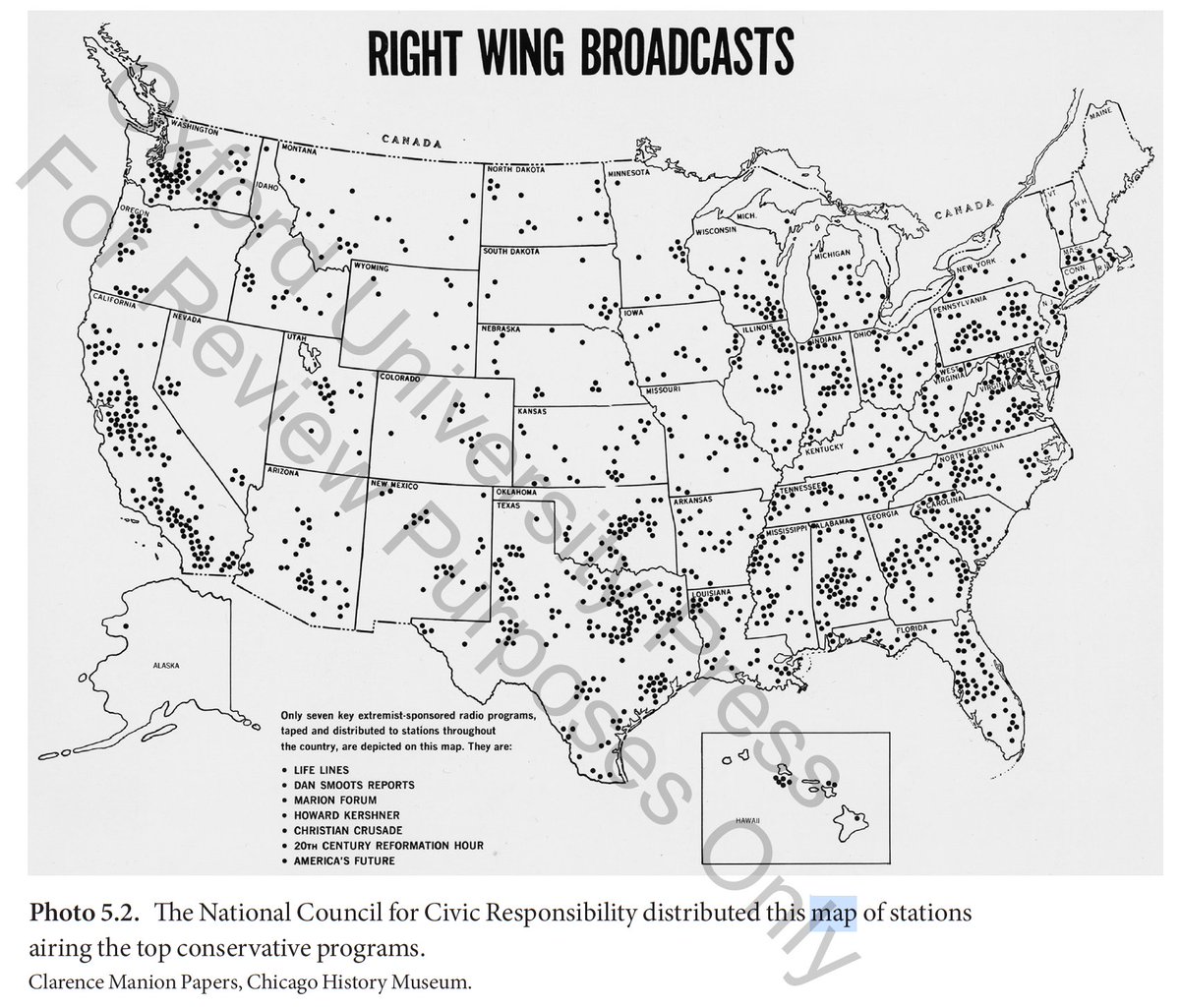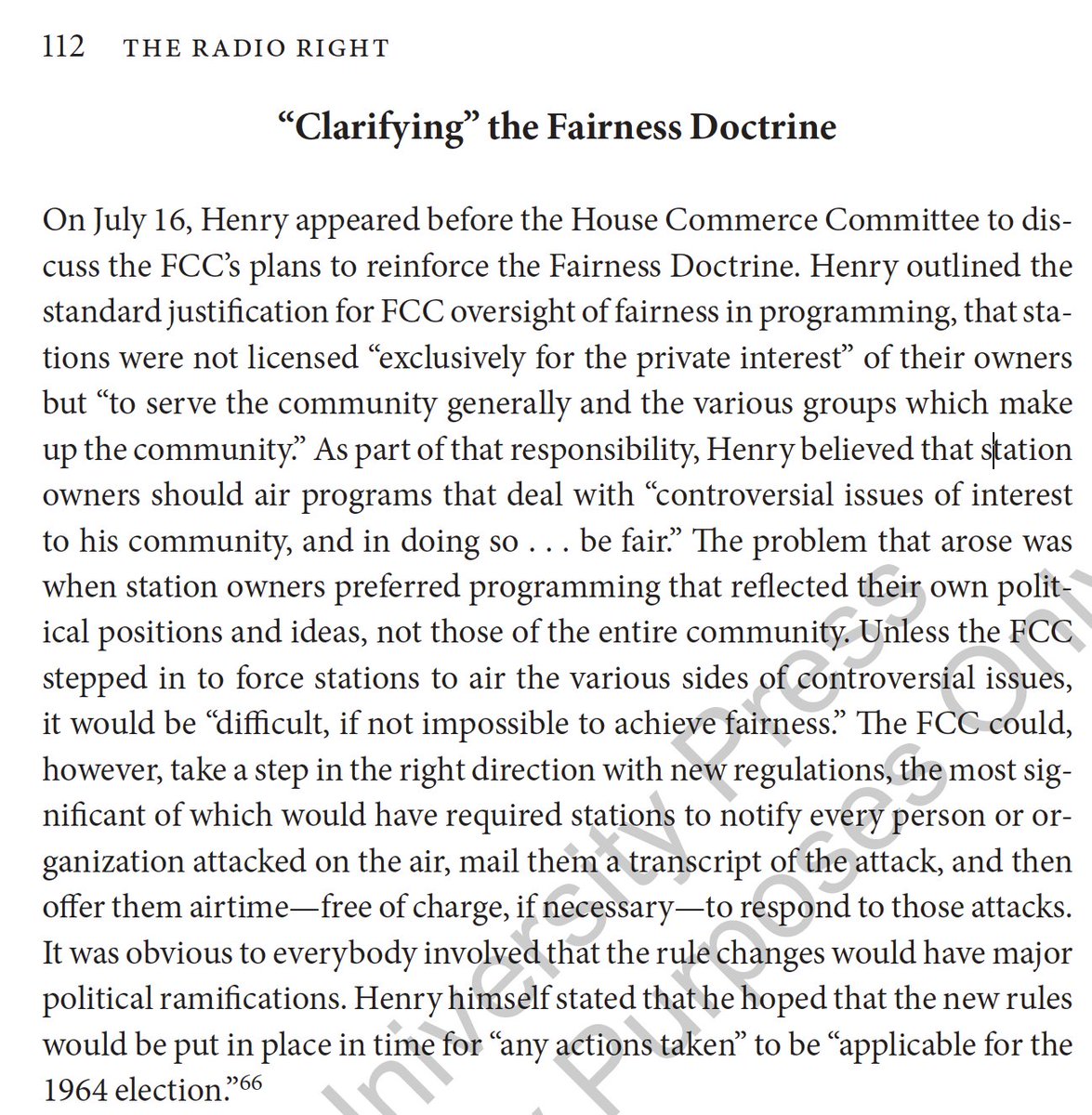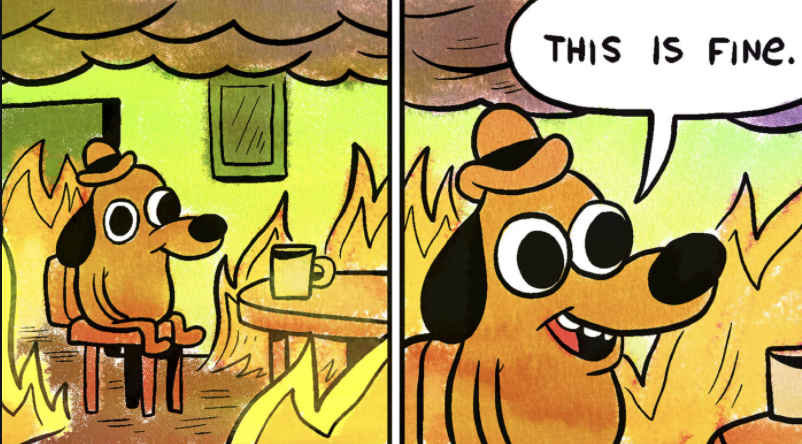Chairman @AjitPaiFCC intends to issue a rulemaking to “clarify” #Section230. While rulemaking power is theoretically limited, it is functionally vast. A dysfunctional Congress and deferential courts tend to let FCC rulemakings stand, even when they are blatantly partisan. /1 https://twitter.com/AjitPaiFCC/status/1316808733805236226">https://twitter.com/AjitPaiFC...
Rulemaking power is also a power oft abused. I& #39;ll share with you the story of three similar FCC rulemakings from the 1960s, how they chilled radio speech, and how the FCC chairman responsible was a tool of partisan interests. /2
In the early 60s, President John F. Kennedy had a right-wing radio problem. The airwaves were full of conservative broadcasters on hundreds of stations nationwide with weekly audiences as large as 20 million (comparable to Rush Limbaugh at his peak four decades later).
So when JFK appointed Bill Henry as FCC chairman, he told him, “It is important that stations be kept fair,” a reference to the FCC’s Fairness Doctrine rules which were meant to encourage stations to air conflicting opinions on issues of public importance. /4
What Kennedy really meant, however, was keep the stations fair *to me.* One of Henry’s first major actions as FCC Chairman was to issue a “clarification” of the Fairness Doctrine in July 1963. (The FD had only been honored in the breach up to that point.) /5
But Henry’s statement focused on negative examples conservative speech.
Also, note how similar Henry’s rhetoric is to that of contemporary conservative arguments about how social media platforms have public obligations and ought not to favor any particular point of view.
Also, note how similar Henry’s rhetoric is to that of contemporary conservative arguments about how social media platforms have public obligations and ought not to favor any particular point of view.
The first major test of this Fairness Doctrine enforcement push was an effort to batter back criticism of the administration’s Nuclear Test Ban Treaty. The White House even created an astroturfed ‘grassroots’ pro-treaty organization (Citizens Committee for a Nuclear Test Ban). /7
The committee laundered dark money from allied interest groups. Whenever a radio station aired a conservative criticism of the treaty, the committee would threaten to send a Fairness Doctrine complaint to the FCC unless the station aired a pro-treaty message. /8
Indeed, in the fall of 1963 Henry took the opportunity to issue a formal rulemaking known as the Cullman Doctrine. A group of stations near Cullman, Alabama had been reluctant to air a pro-treaty response for free when the anti-treaty program had been paid. /9
They asked for clarification and Henry responded with this rulemaking that stipulated stations had to air responses gratis if a group said they couldn’t afford to pay. (Unsurprisingly, no group ever said they could pay.)  https://abs.twimg.com/emoji/v2/... draggable="false" alt="🙄" title="Gesicht mit rollenden Augen" aria-label="Emoji: Gesicht mit rollenden Augen"> /10
https://abs.twimg.com/emoji/v2/... draggable="false" alt="🙄" title="Gesicht mit rollenden Augen" aria-label="Emoji: Gesicht mit rollenden Augen"> /10
These FCC rulemakings and Fairness Doctrine pressure from liberal interest groups led station owners to drop conservative programming in huge numbers from 1964 on. Every show lost at least a third to a half of their station count in just three years. /11
There’s much more to the story—the role of Walter Reuther, targeted IRS audits, a taped Oval Office smoking gun, suburban housewives boycotting Polish ham imports, converted WW2 minesweepers...it gets weird—but I’ll just link to my book below. /12 https://www.amazon.com/Radio-Right-Broadcasters-Government-Conservative/dp/0190073225">https://www.amazon.com/Radio-Rig...
For now, suffice it to say that the FCC’s rulemakings in 1963 had played an indispensable role in the most successful episode of official censorship in America of the last half century. That’s the potential power of a mere FCC “clarification.” /13
Now, I don’t know what is going through @AjitPaiFCC& #39;s mind as he wrote his statement; nor do I know what will be in the final rulemaking. I& #39;ve actually been impressed by Pai& #39;s principled stands in the past. But... /14
But it is hard not to suspect that he is responding to partisan political pressure exerted by the man who nominated him to his position and leadership from the party with which he is affiliated. I do still hope to be pleasantly surprised with an anodyne rulemaking. We’ll see. /15
But the irony of the moment is that conservatives of the 2020s are ignorant of their own history. They are eager to hand a loaded, regulatory gun to those in power without thinking about the potential downside consequences when their side is no longer in power. /16
Conservative broadcasters in the 1960s learned quickly that having the government ensure “fairness” on the airwaves was a bad idea; their ideological descendants today naively assumed that having the government ensure “nondiscrimination” or “neutrality” will be fine. /17
If they get what they& #39;re asking for, they may learn to rue it.
So did those involved in JFK’s censorship campaign in the 1960s; when Richard Nixon used the threat of Fairness Doctrine rulemaking to intimidate CBS into giving him more favorable coverage... /18
So did those involved in JFK’s censorship campaign in the 1960s; when Richard Nixon used the threat of Fairness Doctrine rulemaking to intimidate CBS into giving him more favorable coverage... /18
...these former democratic operatives realized that it wasn’t pleasant when the shoe was on the other foot. Present day conservatives may also have to learn that lesson the hard way. /19

 Read on Twitter
Read on Twitter





